EEF Manufacturing conference: security, smart cities and Brexit
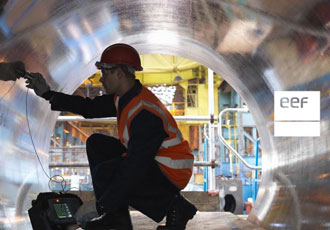
At this year’s EEF Manufacturing conference it is safe to say, the day did not disappoint. With a lot riding on the consequences to UK industry and companies with Brexit looming, the largest number of people to date attended the day to hear answers and truths about what the professionals and our Government think it will happen. With speeches from Liam Fox Secretary of State, and Leader of the opposition Jeremy Corbyn, there was a definite feel of excitement from the audience, and the general theme of ‘Global Britain: Change, Opportunity, Growth’ ran significantly throughout the day.
Martin Wolf, Chief Economics Commentator of the Financial Times, started things off and gave an empowering speech in which he stated that the world economy is looking great, but there are risks. “Under a Canada style deal the UK GBP will be 5% lower in 15 years thanks to Brexit. However at the moment we have no freedom of trade, and we could rule on our own!”
The EEF Manufacturing conference this year was slightly different to previous events in that it held workshop sessions, one in the first half and one in the second half of the day which included: The Smart Energy Revolution, Support and Sustain your Post-Brexit Workforce, How to Minimise Trading Friction with the EU, Steel Forum - Steel in a Low Carbon World and How Cyber-Secure is your Business?owH
Smart Energy Revolution
The first session I went along to was the Smart Energy Revolution, as this topic is hot in the industry at the moment and will only grow as we do.
Professor Steve Evans, Director of Research, Centre for Industrial Sustainability at University of Cambridge, was there to lead the panel and got the audience thinking by stating that the UK has the best knowledge about energy efficiency than any other country, and that this is a strength that we should be using.
The panel also included Tony Walker, Managing Director, Toyota Motor Europe, who explained: “A third of energy reduction is found from switching things off and using equipment more efficiently. Small things that are easy to do.”
It was discussed that to improve we need to:
- Analyse all of energy usage
- Use real-time data to map it out
- Establish strong links between productivity and quality
So how do we do all of this? One way is to keep everyone motivated. Toyota are big users of steam, which has led to the company moving away from massive industrial energy consuming boilers and are now using small localised boilers and dehumidifiers.
Walker said: “Toyota has reduced manufacturing energy used per vehicle by 70% in the past few decades as it is constantly achieving 8% improvements.”
Peter Bance, CEO of Origami Energy added that energy used to be boring but now it is not, and the global smart energy revolution is well underway.
We now live in a digitalised world, and this is an opportunity. Digitalisation is changing everything including energy. It’s decentralisation, decarbonisation and digitalisation that’s shaping the energy revolution of today.
Bance added: “Money is being created in the grid system, but it is hard to follow, that is the job of technology.”
Hiten Sonpal, Head of Specialist Sectors, at Lombard started by saying the energy market is transforming to make the most of the situation by tapping into increased energy savings, allowing new income streams.
Sonpal added: “We are not going to be able to replace all our carbon – that isn’t realistic. But what is realistic is to improve on energy efficiency.”
And to improve on energy efficiency will take insight – rich, real-time data which can indicate wider business processes to improve and generate further savings and productivity.
Walker came back to point out that Toyota highlighted the massive reduction in Co2 available from the hisarna technology trialled in the Netherlands. The EV charging infrastructure and edge of grid investments, combined with intelligent charging scheduling and autonomous vehicles, are all signs the revolution is coming, and the panel agreed.
Professor Evans continued: “It is the first time day time prices are lower than night time prices on the grid. That has never happened before in the UK in over 100 years.”
Bance added that bidirectional charging and smart technologies are key. “Origami Energy holds a positive attitude towards digitising energy distribution and consumption, as this will create huge gains and allow us to ride out waves of increased energy consumption and update the energy grid in years to come.”
Sonpal addressed a question about lighting energy by saying: “LED lighting is the most important thing. You don’t need government funding as pay backs are so great and they last so long. It is a topic close to my heart and probably the most simplistic thing not in just manufacturing but in all sectors. It’s efficient and we have seen customers drastically reduce energy bills and carbon footprint from it.”
Then, when Professor Evans asked for a show of hands in the audience as to who used smart lighting, as you can image the majority of the audience were smart and many had invested in LED lighting.
Sonpal left us with the closing message: “If you do one more thing, do LED lighting, the benefits are shown in the light quality and maintenance cost as well as energy bills.”
Leader of the opposition Jeremy Corbyn
Although there are guest speakers at the event every year, this year felt slightly more important and exciting as leader of the opposition Jeremy Corbyn was making his speech, and from the vibes I picked up from the crowds, for a lot of people this was the highlight of the day.
As you can imagine he got the crowds going with his speech in which he said he wanted to rule out a ‘sweetheart deal’ with the US, but does that mean no transatlantic agreement? He stated: “You achieve a relationship with respect not by threatening Europe and undercutting them.”
The suggestion was that the Labour MP was leaning more towards being nicer to Europe and not giving in to America.
“Businesses are crying out for infrastructure investment,” Corbyn stated and went on to add that this is why Labour has promised to create a National Transformation Fund to upgrade British transport, energy and digital infrastructure.
Furthermore he went on to focus on women. With women now comprising more than 40% of GPs and 50% of all solicitors, but only 8% of professional engineers, he claimed it was time for change. “That figure has remained static under this government, and should be addressed not entirely as a matter of social justice but as economic importance.”
He concluded: “We should recognise that there has to be a movement of especially skilled workers across Europe into the UK.”
My meeting with Infor
Infor is a company that has the right solutions for every aspect of business. It builds complete industry sites in the cloud and deploys software that puts experience first, leverages data science and integrates easily with existing systems. Infor, who were a sponsor company at this year’s EEF Manufacturing Conference, is the third largest enterprise software provider that works within industrial manufacturing, automotive, chemicals, healthcare, high tech and electronics and the public sector – just to name a few.
At the conference this year I met with Andrew Kinder who shared his thoughts on what we can expect within manufacturing and what that may mean for his company.
“Infor are a company who are predominantly now part of the digital transformation journey. Half the industries we serve are in manufacturing, so today, and the future of UK manufacturing is important to us.”
Kinder explained that Infor try to be different and understand what each industry needs specifically, and provide enterprise applications and a digital journey for that industry.
“To bring that to life, each industry is treated quite uniquely, so we don’t believe in one size fits all. We look at the industry. The needs in the food industry are very different to those of the automotive industry or the aerospace and defence industry – and why would anyone want the same solution, it doesn’t make sense.”
How are these industries are using technology to transform themselves and manufacturing supply chains? Infor work with heavily engineered products as part of discrete industries, and then works with other sectors which are focussed around processed manufacturing products - so industries such as food, chemicals and even fashion including the Arcadia group.
Kinder commented: “London is a great place for fashion and manufacturing, and fashion is an interesting blend between the retail side, and more into the supply chain of retail – for example it is all about how you source the fabric and make the fabric, covert it, design it and ship it, manage the distributing - all in an efficient way.”
Kinder then went on to talk about digitalisation and began with a statement: “I think manufacturers need desperately to address the digital agenda, to improve their differentiation, their competitiveness. Particularly when you think about how they are going to compete on a global stage. You know we are somewhat limited in what leavers we can pull in the UK - we are a high tax, high cost economy so we are never going to be the cheapest place to build, and if we are going to attempt to build a market, distance is a charge and distribution costs will be there.
“But what we can differentiate on is smarts. In terms of innovation, we can be the most connected. We can take new technologies to market as fast as anywhere, and we should really differentiate in that space. For example energy. We are one of the pioneering leaders in energy and sustainability, we do more in that space than anywhere else.”
The UK is a leader in energy and sustainability, and has leadership positions in areas such as aerospace, and in some cases in pharmaceuticals and bio-sciences, and although some people may dispute it, Kinder believes we have some leadership in automotive. “Everyone thinks about the Germans for that, but look at what Toyota have done, and Jaguar Land Rover. We also have McLaren - one of the most advanced facilities in the world.”
Kinder believes the UK can have leadership competitive business in all these sectors, if we back it up with Government policy and decision. “If they turn good words into good actions I don’t see why not.”
Technology is part of this discussion for Kinder. “We must not shy away from that, we must get past digital as being a topic we are interested in talking about and actually turn it into something we are doing something about.”
Kinder said that he thought the argument about digitalisation has been well and truly made and EEF have done a great job promoting that. But on his journey around the UK to see manufacturers there was still not enough execution on what great ideas and innovations companies have, and they still seem to need some help in making these a reality.
When I asked Kinder ‘what does Brexit mean for the future of UK manufacturing?’ His immediate response was a laugh followed by the response: “Who knows!”
In the best case scenario there will be growth, but Marin Wolfe’s personal view point earlier suggests we won’t grow as much as we would have done without it. There was not a particularly optimistic outlook, but that is looking at the economy as a whole. Kinder commented: “I think you can take individual companies and individual sectors and you can take advantage of everything Britain has to offer; from its innovation from its legal system, and from its contacts with the other parts if the world, and have a very successful energetic business.”
He added: “Those opportunities are there for sure.”
Infor is a global business, and the globe continues to manufacturer, so Kinder expressed that he was in no way worried about Brexit. “Look at the changes that have taken place. We just follow wherever the manufacturing and supply chain world is. Whatever we do, businesses will find a way to do businesses. I am not worried for Infor or for manufacturing, because manufacturers will find a way.”
Infor being a sponsor company at the day, meant people could see Infor has a voice both for manufacturers and their wellbeing, as also specifically relating to Infor’s Brexit panel, the company has a voice on how technology can be used to support human resources.
“Good software and technology, and good artificial intelligence allows you to make a choice with less turnover and more successful hiring and more successful training. One element of a HR story is about the manufacturer and how they use their resources and technology to do that. But the other side is looking beyond that and at the millennial - what makes them attractive to go into manufacturing in the first place.”
Kinder explained to me that now things are very different. Previously manufacturing was seen as just assembly lines, dismal places, but now with today’s technology it is so different. Now you go into a production line and see people using smart tech, virtual reality and 3D printers and it energises people in clean factories. So with the world of advanced automation, and robots on factory floors and assembly lines, the real question is who really wants to be doing these jobs?
Experts have been saying for 20 years that robots were taking human jobs, but Kinder believes that the number of people in the manufacturing and supply chain ecosystem has not gone down at all. The jobs now are different.
“Now you see a product that is leading edge and competitive in the world, and you are going to be excited about that – you are proud to be part of some of these companies. So I actually think there is a lull for technology and making sure manufacturing looks and feels that way, and engineers want to be part of the next big digitised thing.”
How cyber secure is your business?
My afternoon workshop was all about cyber security, again a topic that relates to everyone in manufacturing. The panel was chaired by Ewan Lawson, Senior Research Fellow, Royal United Services Institute (RUSI), who was joined by Nick Yarham, Client Engagement Manager at Corvid - Ultra Electronics, Darren Joint, Managing Director and Co-Owner at Vikings Signs, Paul Hingley, Business Manager – Data Services at Siemens Digital Factory and finally Martin Overton, Cyber Specialist at EMEA, AIG.
A clear message that was raised almost straight away was that cyber security raises not just a challenge but an opportunity, and the Government aims to make Britain one of the securest places. With the private sector and financial sector, there are always new ways of thinking about national security.
Lawson shared: “When a criminal steals your data they also hold intellectual proprietary over you. They have access to operational technologies with various purposes.”
Yarham explained that Corvid Ultra Electronics ensure they have an understanding of a business, whether that is a handful of users, or an enterprise, as you need to understand the level of your risk. You can’t address cyber security unless you know the level of risk.
This impacts:
- Information assets
- Confidentially
- Integrity
- Availability
“You need the attack surface to be as low as possible, and therefore firewalls are absolutely essential. The bad guys testing malware will do everything they can to avoid detection,” Yarham said. He added that one way to help yourself is to keep dwell time as low as possible.
Hingley, from Siemens Digital Factory, shared that Siemens was involved in security issues within product placement, and a few years back they had to rethink everything. “The availability of data depends on time frames.”
We cannot stop what is coming – IoT - but what manufacturers can do is take the advice being given and look at security for their infrastructures, and take advantage of this new world of digitalisation.
Overton of AIG said: “Data breeches happen to one in four of us, so it’s more a case of a when it happens to you, not if.”
Did you know 50% of breeches happen internally? Data breeches can simply occur from people leaving paper and laptops on trains, in taxis or just sending your partner a spreadsheet to look at that has hidden data on that you were unaware of, and this still happens. Overton added: “Every application is a risk – even a kettle.”
Simple aspects need to be looked at and thought of. People think cyber security arrives from hard complex issues, but more often than not it is the simple things that are riskier.
Hingley said: “If you get it right in your business, you are likely to get it right in your home, or vice versa.”
Cyber essentials are a good start, copiers and printers are all devices with a hard drive that holds data, so when they come to the end of their life-cycle people just dispose of them, and forget about the important data on there.
Hingley added: “You can be hacked through anything, even your refrigerator or air conditioning unit.”
Joint added: “People who are just thinking about cyber security need to implement it. It is worrying when the industry is so huge and constantly growing. Then you need to think, where will AI come into this? That may lead to a skills shortage like in the manufacturing industry.”
Overton responded: “AI is a good thing, but should not be seen as a silver bullet, there needs to be a good mix with AI.”
Cyber security will come into the manufacturing industry, and we need to take small sensible steps. Companies from the supply chain are constantly asked how and where they are implementing cyber security, because it is no longer a thing of the future – it is a necessity.
The panel suggested manufacturers can start with basic things such as backups which should be completed all the time, and addressing your situation – for example if you have been attacked, that is okay, you just need to identify what is there and how you can extract it.
There are a lot of technologies around IT that can help to minimise the risk of attack, and for peace of mind and sanity remember, 70-80% of threats can actually be treated with basic security software.
Overall it is fair to say that there was a sense of positivity that ran throughout the whole of the day, and although a lot of was spoken about, there were still many questions left unanswered as people walked out of the QEII Centre.
Similar articles
More from EEF
- Automation and digital advances to create jobs in UK manufacturing 24th April 2019
- New programme helps industry leaders achieve more 27th March 2019
- Electronics sector booms and provides growth in manufacturing 25th March 2019
- Employers must shout out to promote the benefits of apprenticeships 5th March 2019

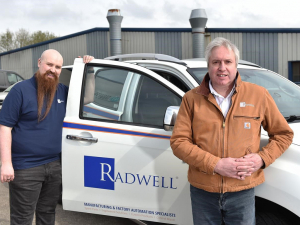
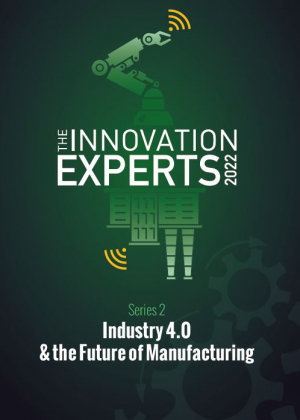
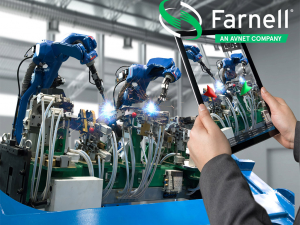
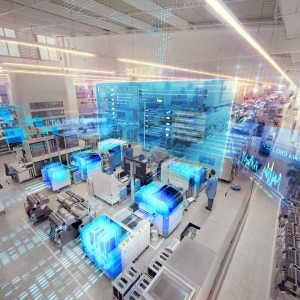







Write a comment
No comments